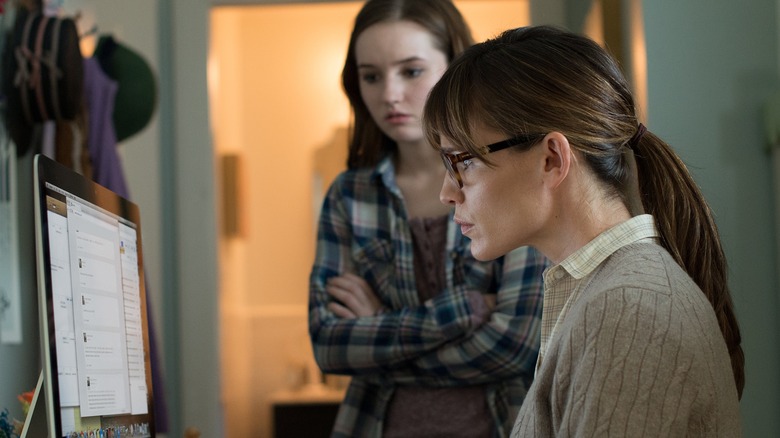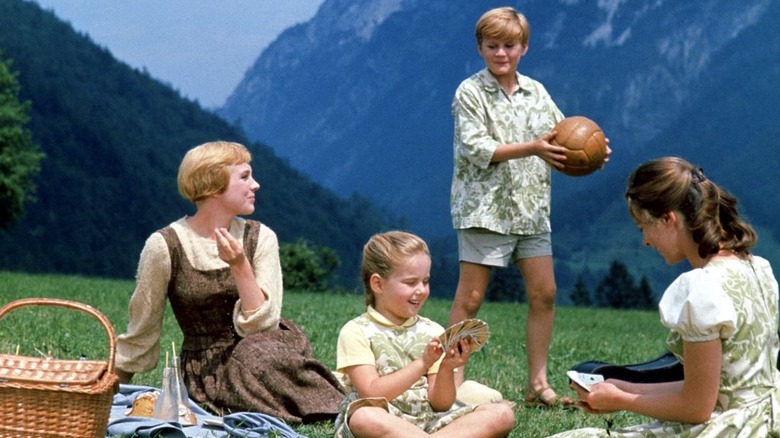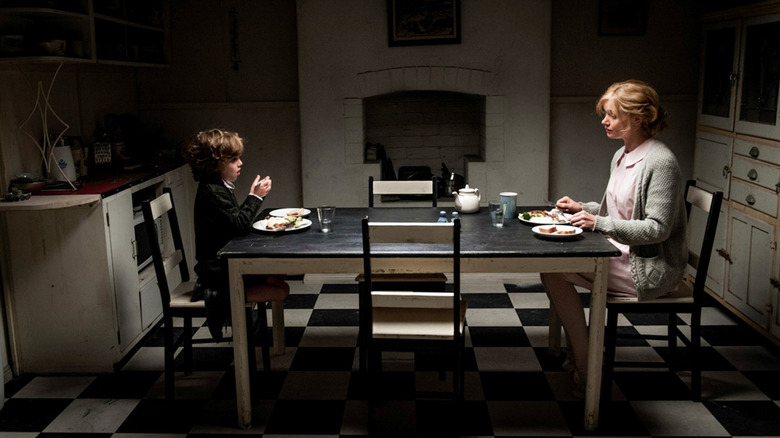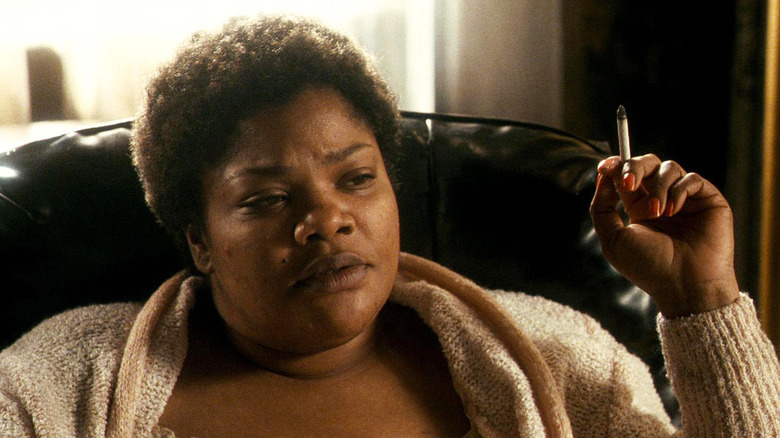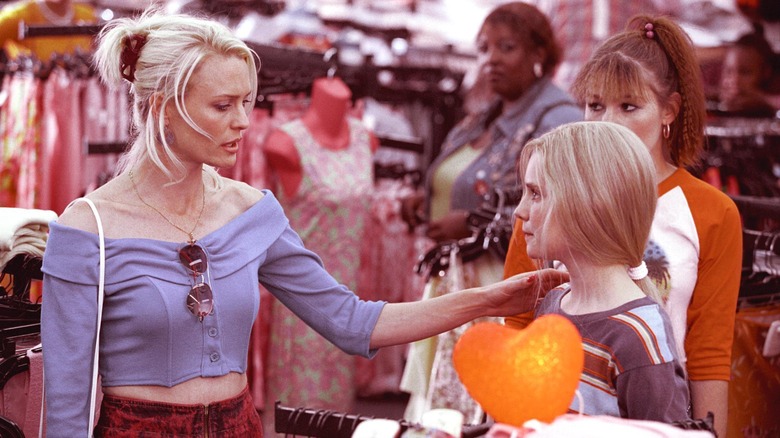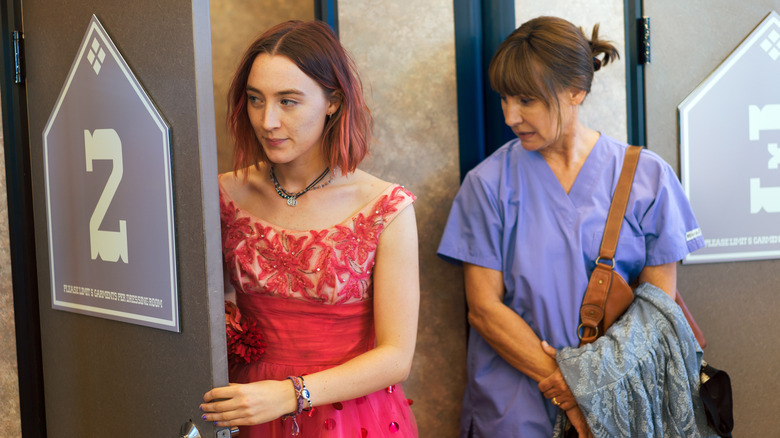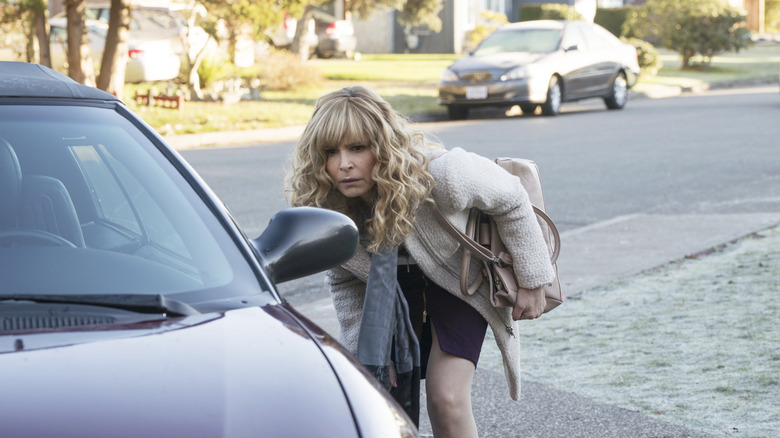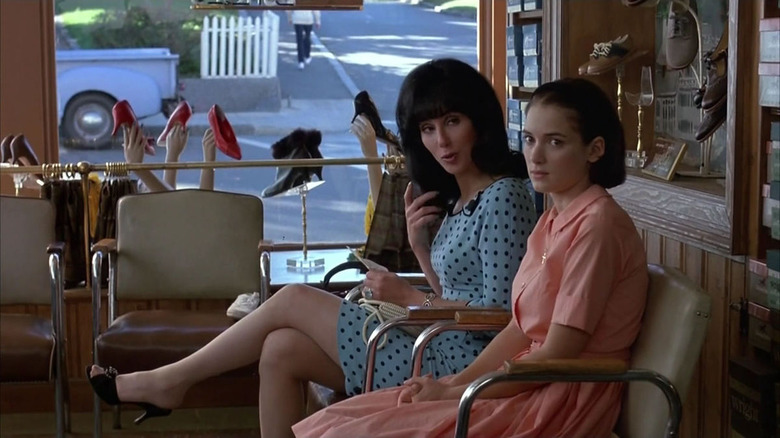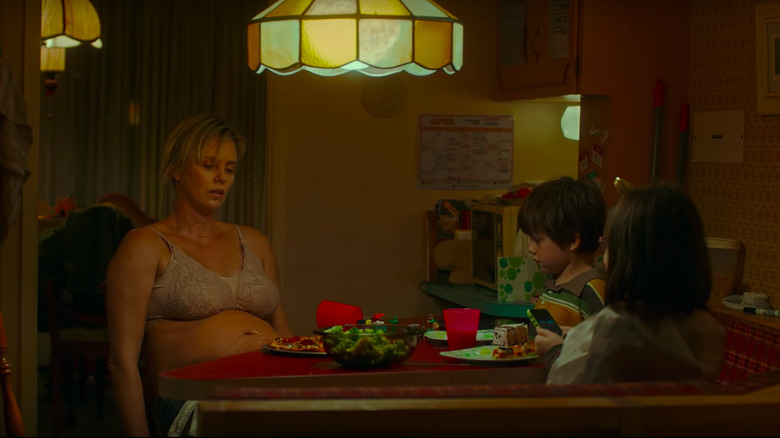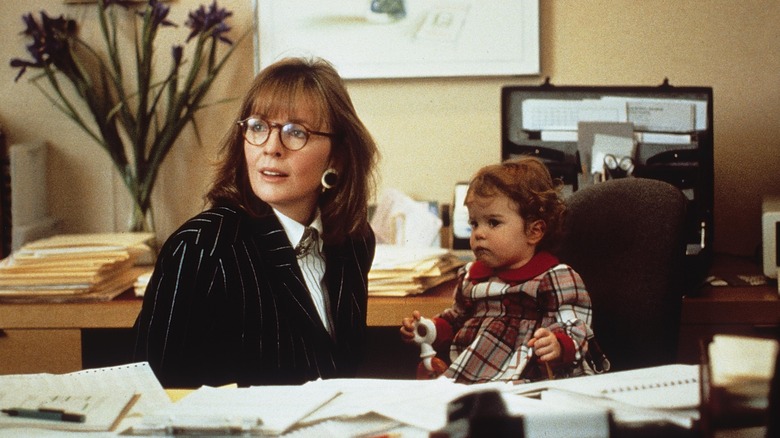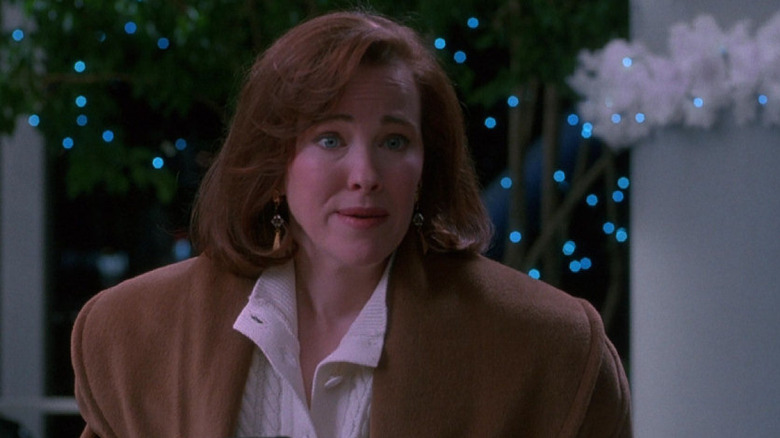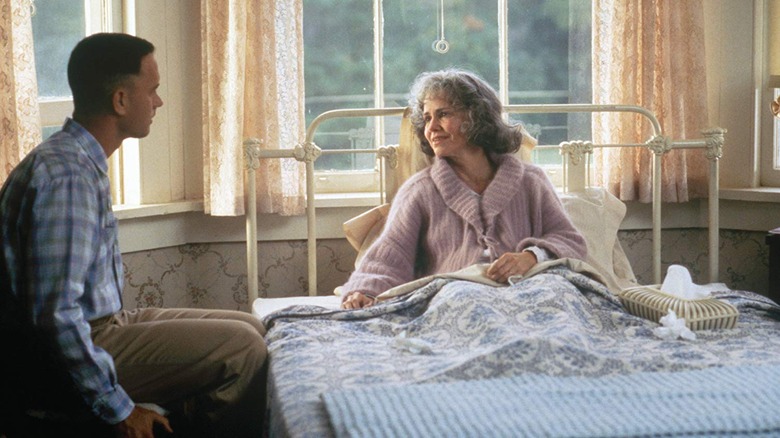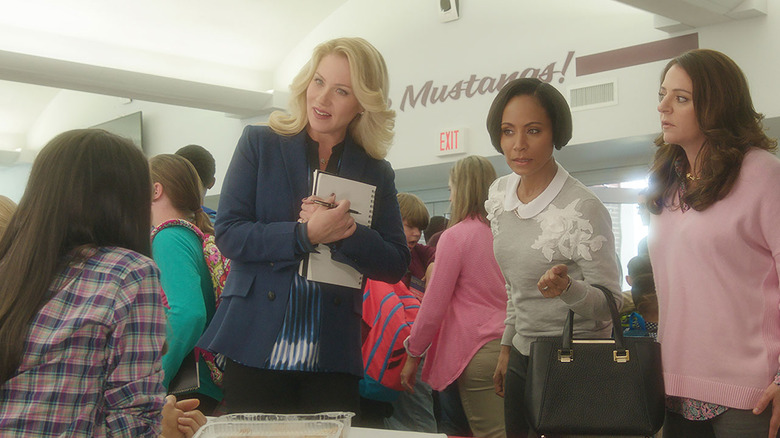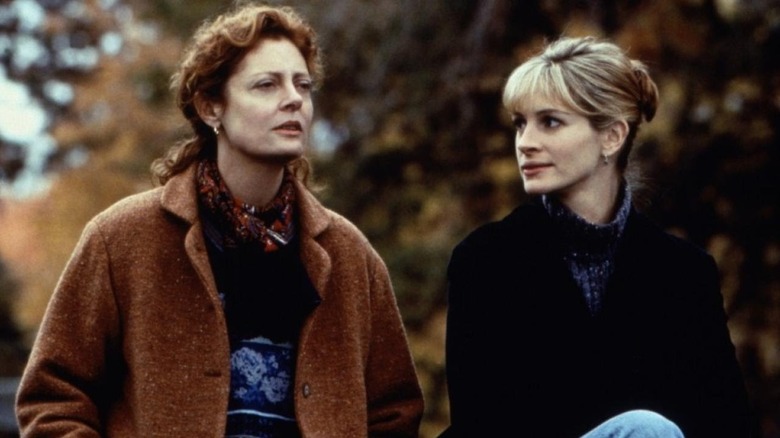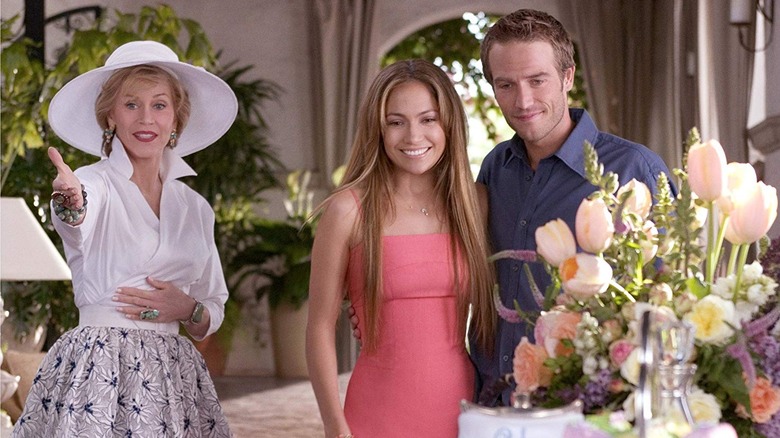Things Movies Always Get Wrong About Being A Mom
If someone were to ask you to name your favorite movie mom, chances are you'd be able to list at least a few fictional ladies off the top of your head. Motherhood has been the subject of countless Hollywood films, from 1942's Bambi to 2018's Tully. While there are certainly a few movies out there that have done well portraying realistic moms — critics have praised The Kids Are All Right for it — many others have missed the mark.
In an article for Inside Higher Ed, Laura Tropp, a professor at Marymount Manhattan College who specializes in media and motherhood in popular culture, discusses the way motherhood is stereotyped. While the "helicopter mom" (think Jennifer Garner's character in Men, Women & Children) continues to be a major character, Tropp says mothers now "recognize the toll it takes to live up to the ideal of the perfect mom." Realistically, there's no definitive answer as to the right or wrong way to be a mother. But that doesn't mean movies don't fall into the trap of stereotyping them. These are the things movies always get wrong about being a mom.
Motherhood is magical
If we're to believe the classics — those films that came before the second-wave feminist movement of the '60s and '70s — motherhood is beautiful and easy. Women like Donna Reed's Mary Hatch in 1946's It's a Wonderful Life portray a kind of idealistic notion that being a mother is a dream come true. 1965's The Sound of Music presented it as an actual musical, complete with dancing on hillsides.
As every mother knows, motherhood is a far cry from song and dance routines in the open air, and it really shouldn't even be that in the first place. Bunmi Laditan, author of The Honest Toddler: A Child's Guide to Parenting, wrote for The Huffington Post, "I don't have a single memory of doing a craft with my parents." She explains how the majority of her own upbringing was spent with friends and siblings, and it was every bit as magical as a movie because "childhood is inherently magical." According to Laditan, creating such experiences puts "tangible" pressure on a mom and typically results in something a child won't even remember in a few years.
Or it's a depressive nightmare
When motherhood winds up being anything other than "magical," moms have a tendency to place blame on themselves. In a 2017 survey conducted for TIME, "half of all new mothers had experienced regret, shame, guilt or anger," typically due to circumstances beyond their control (like needing an epidural or C-section). And according to research published in 2017 by the CDC, approximately one in nine women experience symptoms of postpartum depression nationally. While these are all fairly common experiences for new mothers, their portrayal in film have been less than forgiving.
Movies like the 2007 film Joshua or 2014's The Babadook turn a mother's difficulties into terrifying affairs. In Joshua, Vera Farmiga's Abby struggles emotionally with having a new baby, which is only amplified by her sociopathic 9-year-old son's manipulative behavior. Similarly, The Babadook's Amelia is tormented by a supernatural monster in the wake of her own emotional difficulties with her 6-year-old son. In both films, the mothers are forced to endure brutal punishment as a result of their inability to parent.
Moms on welfare are neglectful, on drugs, or living in a trailer
The film portrayal of those on government assistance hasn't exactly been a favorable one. 2009's Precious is a near-perfect example of the stereotypical welfare mother. Mo-Nique plays Mary, an unemployed mother of multiple children who lives in a Section 8 tenement in Harlem. She's physically, verbally, and sexually abusive to her teenage daughter, and she exploits her daughter's situation in order to get more money from the government.
In the book The Mommy Myth, excerpted for Ms. Magazine, University of Michigan Communication Studies Professor Susan Douglas and Smith College Philosophy Professor Meredith W. Michaels discuss the portrayal of the welfare mom in media and its opposition to the idealized "celebrity mom." They say, "At best, these mothers are pitiable. At worst, they are reprehensible opposites of the other mothers we see so much of, the new standard-bearers of ideal motherhood — the doting, conscientious celebrities for whom motherhood is a gateway to heaven." These women we see on film have perpetuated the idea that mothers on welfare are not worthy of being mothers at all, that they lack empathy or an identity altogether. This false representation only serves to divide us.
Foster moms are just as bad
Even those mothers who, by all accounts and purposes, are doing their part to help care for unwanted children can't escape the harsh scrutiny of Hollywood's portrayal. In 2002's White Oleander, teenager Astrid is shuffled from dysfunctional foster home to dysfunctional foster home, from a relapsed alcoholic who shoots her in a drunken rage, to a Russian immigrant who uses her for cheap labor. The family comedy isn't safe, either. 1995's It Takes Two sees one of the Olsen twins having to deal with a foster mother who's only in it for the money.
Christy Tennant Krispin, a foster mother in Washington State, wrote a piece for Vox in which she compares real life fostering to what's seen in 2018's Instant Family: "...while the film does depict at least one stereotypical set of jaded foster parents who are clearly only in it for the money, most of the foster parents I know are... well-meaning people who genuinely want to make a difference in the lives of children by welcoming them into their family." Sure, there will always be bad examples, but the media highlights them, making them out to be the majority. Unfortunately those truly caring and loving foster parents often lack representation in the media.
Moms and daughters never get along
If there's a single stereotype that we can point to in nearly every film about mothers, it's the one where moms and daughters go through life despising one another. From Lady Bird to Freaky Friday to The Diary of a Teenage Girl, if there's a mother-daugher duo on screen, you can bet they won't get along with each other.
But it isn't all that bad. Roni Cohen-Sandler, psychologist and co-author of I'm Not Mad, I Just Hate You! A New Understanding of Mother-Daughter Conflict, says in an excerpt for Psych Central that problems arise from lack of communication. "In some ways they can be so close or feel so close that they believe that each of them should know how the other one feels." But the issue can be solved pretty easily, so long as moms and daughters remain open and honest with each other. No body swap required.
Single mothers are selfish
Being a mother is a tough job, but attempting to do it solo is nothing short of an uphill climb. You'd think that movies would be more sympathetic to the situation, but we frequently see single mothers portrayed as selfish and cold. Take 2016's The Edge of Seventeen, for example. Kyra Sedgwick plays Mona, a recently widowed mother of two who spends her time focused more on the men she beds than on her own kids. Her inability to properly parent results in a relationship with her daughter that looks more like friends than parent and child.
Perhaps it has something to do with single mothers' need to prove their self-sufficiency. In her book Single Mother: The Emergence of the Domestic Intellectual, excerpted for The Atlantic, Jane Juffer, Associate Professor of English and Feminist, Gender, and Sexuality Studies at Cornell University, explains that regardless of their background, all single moms participate in this obligation. That doesn't make them inherently selfish, of course. But how interesting would a Hollywood production be if a woman facing social hardship were drama free?
Mothers are generally in charge of parenting
The "women are better caregivers" stereotype has a long history in American culture. We've seen it in 1956's The King and I, 1964's Mary Poppins, and even 1953's Peter Pan (which taught girls that they should prepare for being mothers incredibly early on).
With the increase of women in the professional sector over the last several decades, our real-life attitude toward gender roles and parenting seems to have changed. According to a Pew Research Center survey aimed at exploring the roles of mothers and fathers with new babies, 71% of those surveyed believed it was important for a baby to spend equal time with both their mother and father, while the margin between those who think women would do a better job parenting than both a mother and a father isn't that large — only 53% to 45%.
Maybe one day we'll finally stop seeing so many films in which the paternal figure takes a back seat in parenting (or is just completely absent, à la 1990's Mermaids).
Motherhood is a thankless job that involves living in sweatpants and baby vomit
There's an idea floating around Hollywood that mothers — particularly new mothers — are so overwhelmed with actually being a mother that they simply lose all ability to take care of themselves. You know that mom: hair that hasn't been washed in days pulled up into a messy bun, sweatpants, her SO's old band tee covered in spit-up and vomit. She probably has no clue what day of the week it is. Charlize Theron's Marlo in 2018's Tully is a prime example. The movie poster itself shows her weary face covered in kids' stickers.
In an article for Elle, Sadie Doyle, author of Trainwreck: The Women We Love to Hate, Mock, and Fear... And Why examines the extreme stereotypes we see of moms. She wrote, "I've started to wonder if the anti-parenting lit doesn't infantilize us in a different way — treating us like incompetent, poo-smeared dopes who are routinely outwitted and emotionally broken by people who are, after all, too small to vote, drive, or reliably use toilets." Doyle says that recognizing parenting as not "inherently awful" will actually give mothers a better chance to experience true happiness.
It's nearly impossible to be a successful mother and professional
To take the horror of motherhood stereotype a step further, if a woman were to have a successful career beforehand, then becoming a mother winds up being the worst nightmare imaginable. In 1987's Baby Boom, Diane Keaton's work-obsessed character J.C. tries to convince her live-in boyfriend she can raise a child because a lot of working people do. Sure enough, it's harder than than she thinks, and she's met with one baby disaster after another. But of course she is, because working women know nothing of child rearing.
Obviously, this isn't true. According to a Pew Research Center study, moms now spend about 16 more hours a week working than they did in 1965. And 70% of moms with kids under 18 are in the workforce as of 2015, a number that's gone up 47% since 1975. Not to say that the work-life balance is in any way easy, but if it were as impossible to do as films makes it seem, it seems unlikely that women would be doing more of it now than they ever have in the past.
Working moms produce "latchkey kids" who are out of control
The inevitable result of a working mom is the so-called "latchkey kid," the child who's left with little more than a key to their house, a television, and their own imagination. According to Hollywood, it's a recipe for total home annihilation. 1990's Home Alone is so famous for this stereotype that latchkey kids are also sometimes referred to as "Home Alone children," and while we can laugh at Kevin McCallister's ridiculous antics, we can't help but also loathe his mother for being so busy that she literally completely forgets her child.
Home Alone is an exaggeration of real life (obviously), but it does perpetuate the idea that working moms are too overwhelmed to properly care for their children. While kids of working parents might not receive 24/7 supervision, though, that doesn't mean that they're neglected, or that they'll wind up destroying their family home. Kelly Wallace, a journalist for CNN, grew up as a so-called latchkey kid but had a very different experience. "My sisters and I turned out more than fine," she says, recalling how they would be left to take care of each other until the end of their mother's workday.
Mothers have no life or purpose outside of being a mother
The perfect mother doesn't exist. Or, more specifically, there's no formula for who or what the perfect mother is. But in films like 1983's A Christmas Story and 1994's Forrest Gump, the perfect mother is the one whose entire life revolves around her children. She dresses them, feeds them, and — in Mrs. Gump's case — does everything physically possible to give her son the best education.
According to a survey published in Frontiers in Psychology, the pursuit of motherly perfection can actually be detrimental for a woman, and it can lead to what's called "parental burnout." The results of the study state that mothers who feel pressure toward perfect parenting have higher levels of both stress and guilt. This pressure isn't relegated to just home life, either. Moms who struggle with perfection at home also experience a lower work-family balance and, in turn, can have lower ambitions when it comes to their careers.
PTA moms are militant Stepford wives
If you've never been a mom, it's hard to imagine what a real PTA meeting looks like. Instead, we're left to think of them the way they're portrayed in 2016's Bad Moms, where Christina Applegate's Gwendolyn calls for an emergency PTA meeting to announce the formation of a PTA bake sale police squad. Their goal: to prevent the use of banned substances (like eggs and sugar) in bake sale items. Gwendolyn is the quintessential PTA mother. But Gwendolyn is a lie.
The reality is that the PTA — and the parents who comprise it — do a lot of good for their schools. According to the Public Policy Institute of California, 89% of funding for K-12 education comes from state, property taxes, and the federal government. 10% of what remains is left to "other local." Writer, teacher, and self-proclaimed PTA mom Michelle Riddell explains on Motherly, "In an underserved or sparsely populated district, the PTA helps to fill discretionary budget gaps." They also volunteer with the school, as well as local Health Departments. So less Stepford, more superhero.
Stepmothers are awful and must face overwhelming odds to be accepted into the family
Maybe it's a reflection of mothers striving for perfection in the home that makes being a stepmother so difficult. Wednesday Martin, author of Stepmonster: A New Look at Why Real Stepmothers Think, Feel, and Act the Way We Do, helped field some stepmom concerns on the NPR podcast Dear Sugars. In response to one stepmother who wrote in saying she struggled with the idea of loving her husband's kids like her own, Martin explained that she's never interviewed a woman who said being a stepmother was easy. "If anybody said that, within 15 minutes, we were getting into the nitty-gritty, which always involved resentment, anxiety, feelings of failure."
So why do movies — particularly Disney films — insist on portraying stepmothers as evil incarnate? Sara Abdel Aziz, a stepmother and writer for What Women Want (who also happens to be a linguist in pursuit of her third master's degree) is calling for a re-evaluation of how the stepmother stereotype is portrayed in movies. "My stepdaughter deserves a better version of her good stepmother. I deserve a better version of me to be told to my stepdaughter."
Mothers-in-law are insane and possessive
If stepmothers are Disney level evil, then mothers-in-law are the end all be all great fiery demons ruling over Hell itself. 2005's Monster-in-Law introduced us to Viola Fields, the future mother-in-law that none of us want. She's judgmental, combative, and a little murderous. And she's representative of the kind of relationship many women fear they'll have with their own in-laws.
Licensed Marriage and Family Therapist Stephen J. Betchen explains for Psychology Today that while some mothers-in-law may bring their own issues into the family dynamic, like empty nest syndrome, it's frequently a combination of issues from both sides that leads to conflict. He says that in some cases, "at least one partner in a couple was bent on turning their in-laws into outlaws," creating an environment that winds up being difficult for both women and their partner's mothers. In-laws are often vilified, unnecessarily so at times.
